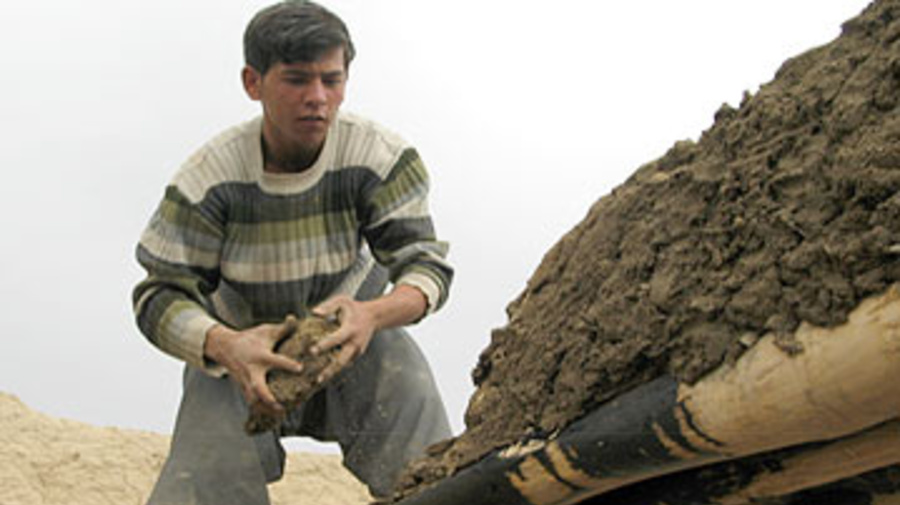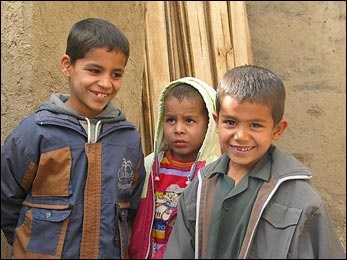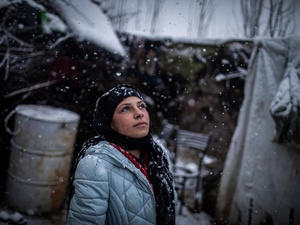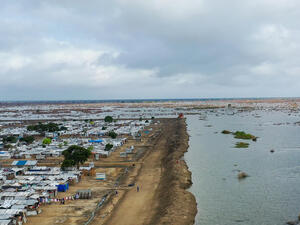Afghan returnees wall off winter with UNHCR help
Afghan returnees wall off winter with UNHCR help

An Afghan returnee in Qarabagh lays the mud where metal roof beams will be placed once it has dried.
QARABAGH, Afghanistan, Nov 29 (UNHCR) - It is late autumn, but still mild enough for Akbar Nusrati to enjoy lunch in the garden of his newly reconstructed house. Until last month, this small patch of earth with its two apple trees was where Akbar, his wife and their three children ate, slept and washed - their only shelter a makeshift tent. With the frigid winter only weeks away, Akbar is grateful to be back in the home he and his family fled during Afghanistan's civil war 13 years ago.
Following the fall of the Taliban in 2001, hundreds of other families from the village of Qarabagh, 50 km north of the capital Kabul, have also taken the decision to return after years living as refugees in Iran and Pakistan. For most, what they found when they arrived was rubble.
"It wasn't recognisable as my house," said Akbar. "The Taliban had destroyed it just as they destroyed all the houses in this area."
Caught on the frontline between the Taliban and the Northern Alliance which defeated them, residents of Qarabagh as well as thousands of families from the surrounding Shomali Plain were forced to flee, seeking safety and shelter where they could find it. Tens of thousands of homes, once abandoned, were razed by Taliban forces.
"Without the help we received, we'd still be living in the tent," said Akbar.
The help, which is provided by the UN High Commissioner for Refugees, has enabled more than 5,000 families in Qarabagh to repair or completely rebuild their homes. In the Shomali Plain, some 14,000 families have received UNHCR assistance and more than 300 water points have been established.
The UNHCR investment in Qarabagh is a fraction of its nation-wide programme to assist the more than 3 million Afghans who have returned since 2002.
Shah Mohammed has just re-laid the foundation of his simple two-room mud house. Like all those who receive UNHCR assistance, Shah has been provided with basic building materials such as roof beams, windows and tools. A small cash grant is sometimes available to help cover other costs. The labour, as Shah Mohammed demonstrates, heaving a metal beam into place, is provided by the home owner.
Four years as a day labourer in Iran allowed Shah to support his wife and three young sons and put away some money for their return to Afghanistan. But when he saw what was left of his home, he realised making it liveable again was beyond his means.
"After I saw the house, I intended to take my family to Kabul because I knew that I didn't have the money to rebuild it," he said. "Then I heard there were organisations helping Afghans return to their homes. In Kabul we would have spent our savings on rent and I wouldn't have been able to feed my family."
While the building work continues, Shah and his family must share with four other families a neighbouring house belonging to his brother-in-law. Conditions are cramped and the prospects of finding work in this once-fertile area uncertain.
But for Shah and other returnees, the removal of the Taliban and the international reconstruction efforts that followed provided a reason for optimism. "Now no one will again tell us to leave," he said.
Determining who receives UNHCR shelter assistance is a community process. Members of the shura, or local council, approach families who have recently returned to assess their needs and vulnerability. A list of potential recipients is then given to a UNHCR partner organisation. Following a further assessment with UNHCR shelter teams, a decision is made.
Those chosen for assistance must own the land they plan to build on and must be able to meet approximately 50 percent of the total costs. With the price of rebuilding a totally destroyed home reaching $1,200, just qualifying for help is no easy task. But without it, thousands more families would be homeless.
Widows such as Magul are of particular concern to the shelter programme. Soon after the death of her husband 10 years ago, her eldest son, Ahmed, left for Iran to escape the civil war then gripping the country and to look for a means of supporting his family. When the Taliban took control of most of Afghanistan, Magul and her other children joined him.
"We're glad we came back, but it's not easy," she said. "We've been living with family since we returned. Soon we will have our own home, a place where my sons can bring their wives when they get married."
With UNHCR support, more than 100,000 homes have been rebuilt or repaired since 2002. Next year there are plans to build 20,000 more.

These brothers will share a room when their house in Qarabagh is rebuilt.
Winter is about to descend on Afghanistan and the freezing temperatures will bring construction in most areas to a halt. Through its winterisation programme, the UN refugee agency is providing supplies such as blankets and plastic sheeting to more than 40,000 families.
But for the newly returned residents of Qarabagh, this winter is not something to be feared. They are back in their homeland and back in their homes.
By Tim Irwin
UNHCR Afghanistan









